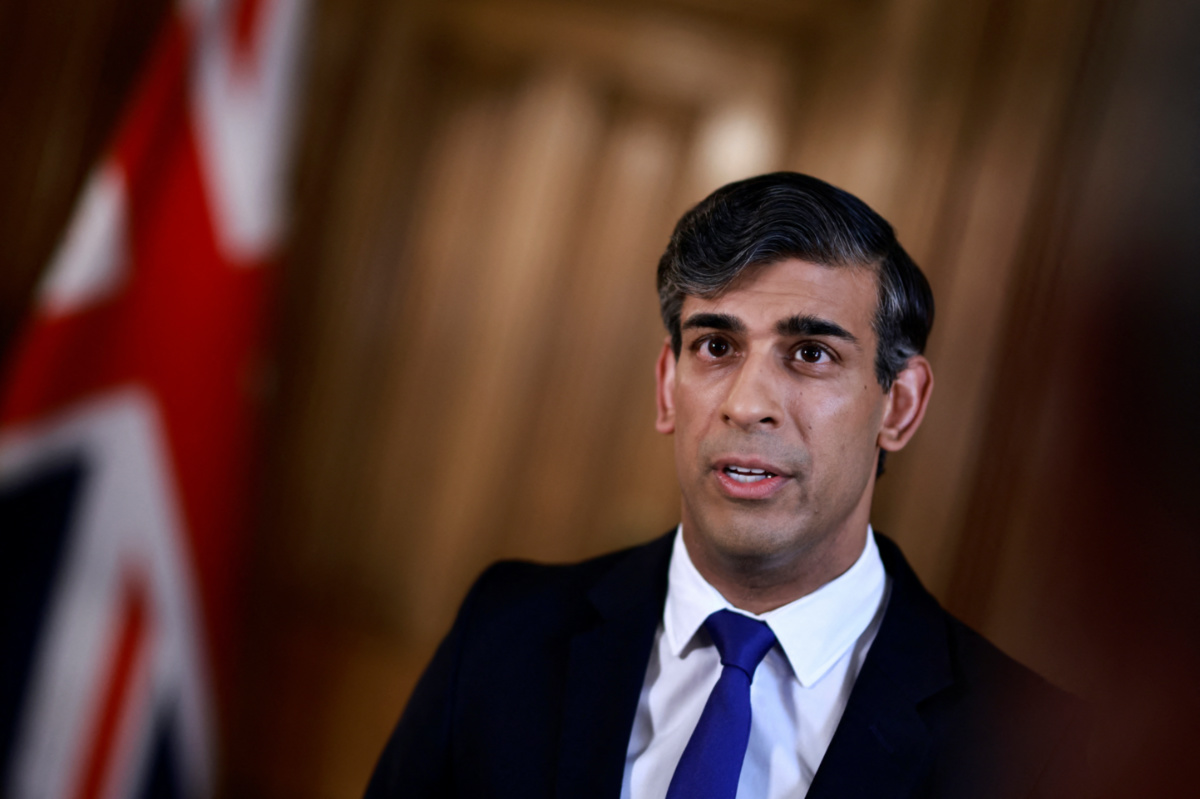London, UK
Reuters
The British parliament is set to finally approve a divisive law this week to pave the way for asylum seekers to be deported to Rwanda, but further legal hurdles could yet hold up or derail one of Prime Minister Rishi Sunak’s key policies.
Sunak has invested huge political capital in the Rwanda scheme whose success or failure might be crucial to his Conservative party’s fortunes in an upcoming election, given his promise it will stop thousands of people arriving without permission in small boats across the Channel.

British Prime Minister Rishi Sunak records a statement on the Iranian attacks on Israel overnight, inside 10 Downing Street in central London, Britain, on 14th April, 2024. PICTURE: Benjamin Cremel/Pool via Reuters/File photo
The new legislation is poised to get lawmakers’ approval, unamended, by the end of the week. But whether the Rwanda scheme does finally get off the ground by the middle of the year as Sunak has promised remains far from certain.
“In our view, the legislation is utterly performative,” said Paul O’Connell from the Public and Commercial Services union which has previously brought lawsuits over the policy and is preparing further action.
“We think the government knows it hasn’t got a cat in hells chance of surviving a legal challenge, but they just want to keep it alive as an issue to fight in the general election.”
Under the policy formulated two years ago, any asylum seekers who arrive illegally in Britain will be sent to the East African nation, in a bid to deter dangerous cross-channel crossings in small boats and smash the people smugglers’ business model.
The first planned deportation flight in June 2022 was blocked by the European Court of Human Rights (ECHR), before the UK Supreme Court last year declared the scheme unlawful.
Sunak’s new law, which disapplies some existing human rights statutes, is designed to override the Supreme Court’s ruling by stating Rwanda must be treated by British judges as a safe destination, as well as also limiting individuals’ options for an appeal to only exceptional cases.
For critics, ranging from senior figures in his own party to the Archbishop of Canterbury, the policy is immoral, unworkable and probably breaches international law. But, some right-wing Conservative lawmakers say it will not work because it is still not tough enough.
After months of parliamentary battles, the government won backing from the House of Commons on Monday and is expected to win votes in the House of Lords later this week.
The Prime Minister’s spokesperson urged the Lords to pass the law, saying it will save “the lives of those being exploited by people-smuggling gangs”.
When will flights go?
How long until deportation flights then leave is unclear, and one government official said it would probably take at least a month from the moment when the legislation is passed.
Charities and human rights groups say they are gearing up to bring challenges on behalf of individuals, although as yet none have been specifically told they would be sent to Rwanda.
O’Connell said his union, which represents border force staff who would help carry out the deportations, would submit a legal challenge arguing the new legislation was unlawful “within days” of the first asylum seekers being informed they will be deported.
The PCS and other unions are also exploring action on the grounds that implementing the policy would put civil servants in breach of international law, especially if the ECHR were to again issue a temporary injunction – known as Rule 39 interim measures – on removals.
We rely on our readers to fund Sight's work - become a financial supporter today!
For more information, head to our Subscriber's page.
The court has amended its rules since the 2022 decision so injunctions will only be issued in “exceptional circumstances” where there was an “imminent risk of irreparable harm”.
Sarah Gogan, a partner at law firm Harbottle & Lewis, said the wording of Sunak’s bill was designed to all but eliminate legal challenges, although an intervention by European judges would be the hardest to overcome.
With his party trailing the opposition Labour Party by about 20 points in polls, and his own position in question, Sunak has been determined to have flights leave as soon as possible.
He has already warned he would not allow “foreign courts” to block his plans and was prepared for Britain to leave the ECHR if necessary.
Only two countries have left or been removed from the ECHR previously, Greece when the military took power in 1969 and Russia after the invasion of Ukraine in 2022.
Even if the legal problems do not block the flights, there are also suggestions the government might struggle to find airlines willing to provide planes, with the charity Freedom from Torture running a campaign to persuade carriers not to participate.
Asked if the government had a contract with a carrier, Sunak said earlier this month: “We’ve got all the plans in place. I am highly confident…I can operationalise the policy.”




